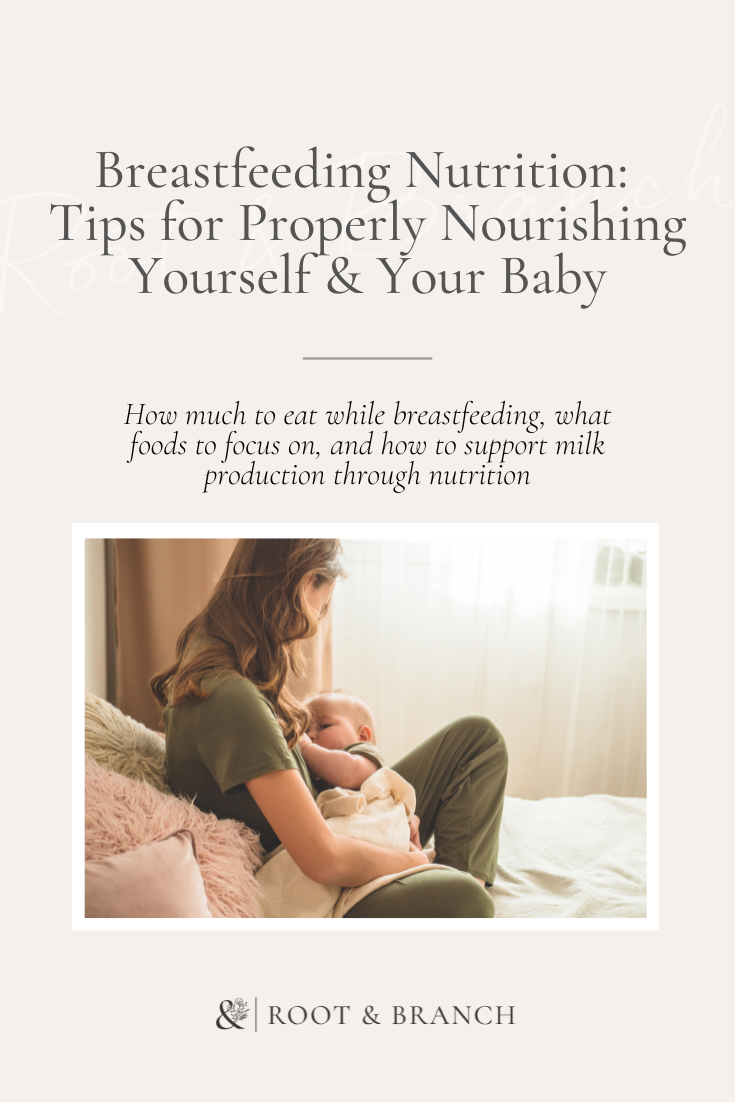Breastfeeding Nutrition: Tips for Properly Nourishing Yourself & Your Baby
There is such a lack of nutrition information for the postpartum period, especially when it comes to breastfeeding.
And whatever is available tends to be very vague (“Just eat a balanced diet.”), is focused on “bouncing back” (“Lose the baby weight fast by following this meal plan!”), or is only centered around what not to eat while breastfeeding (which, let’s get it out of the way- there’s really not much unless you or your baby has an allergy or intolerance).
So when it comes to proper nutrition to not only support milk production and make nutrient-rich milk, but also ensure your body is being properly nourished too, these are my top 7 tips!
Disclosure: This post may contain affiliate links, meaning I get a commission if you decide to make a purchase through my links, at no cost to you.
1. Consume enough calories!
While the “bounce back” pressure for postpartum moms is real, dieting intentionally or simply unknowingly under-eating can actually negatively impact milk production (among many, many other things like energy and hormonal health).
Making breast milk is energy-demanding– milk production increases energy expenditure (“calorie burn”) by 15-25% (1)! Exclusively breastfeeding (or pumping) moms typically need more calories than during pregnancy!
It takes an average of 22 calories to make 1 ounce of milk (2) so in general, exclusively breastfeeding moms need an additional 500-750 calories (and sometimes more) each day.
Overall caloric needs for moms will vary depending on factors like body weight and fat reserves, activity and exercise level, and volume of breastfeeding (i.e. cluster feeding a newborn vs. tandem feeding two little ones vs. feeding a toddler solely to sleep).
However, this typically means needing a total of at least 2,400 calories per day, yet many breastfeeding moms can require 2,600-3,000+- especially in the early months.
Listening to your body is helpful if your appetite is healthy but sometimes, it’s not enough. Hunger cues can become down-regulated when you’re stressed out, sleep deprived, and/or nutritionally depleted– as well as if you’ve been used to ignoring or downplaying your appetite like many women have (thanks again, diet culture).
It can be helpful to calculate your TDEE (total daily energy expenditure) and even track your intake for a few days on an app like Cronometer. Then make adjustments and increase your calories over time.
2. Eat regularly through the day (and possibly the night, too).
Breastfeeding or not, delaying or skipping meals is problematic for your blood sugar, metabolism, energy, and sleep. Eating regularly helps you build a strong foundation and sets you up to get the calories and nutrients that your body needs (vs. only eating 2-3 times per day).
Yet for lactating moms, it’s even more crucial to eat consistently throughout the day. For one, your body makes milk around the clock so especially if you’re feeding often, you need to eat often! And secondly, your body is in a more vulnerable state postpartum due to stress, lack of sleep, and hormonal changes. Long periods without food can cause a release of stress hormones- something new moms definitely don’t need more of!
This typically means having a meal or snack every 3-4 hours but for those cluster feeding/in those early weeks, it may be closer to 1-2 hours- maybe even more frequently (don’t overestimate how intense that hunger can be!)
And if you’re up often/for long periods during the night, you probably need to eat then, too, especially if nursing or pumping during that time.
This can sound like a lot of work. It can be. But it doesn’t need to stress you out and the responsibility doesn’t need to be all on you. A few tips:
Identify easy meals & snacks you enjoy and ensure you’ve got those foods stocked weekly.
Keep nourishing pre-packaged foods stocked (ex: dried fruit, beef jerky, protein powder, frozen bone broth).
Do any amount of prep possible- whether it’s full meals (freezer meals are great) or just certain foods- i.e. wash and cut fruit, roast a chicken, bake sweet potatoes.
Find recipes for quick meals especially 1-pot/pan and/or those that can be made in a pressure cooker or crockpot.
Get support especially early postpartum- meal trains are so underrated!
3. Hydrate + get those minerals in!
Breast milk is around 87% water (3), so it’s important that you hydrate sufficiently. However, there is no need to chug gallons of water- that can actually over hydrate you, deplete important minerals (of which many new moms need more of anyway!) and contrary to popular belief, won’t help milk supply.
The keys to proper hydration: drink mineral-rich beverages throughout the day and obey your thirst. Plain water isn’t going to cut it (our water has become very mineral-depleted) and especially if you filter your water, you want to add minerals back in you can do this by adding a few pinches of sea salt or some trace mineral drops to your water. Other hydrating drinks include coconut water, bone broth, and fresh fruit juices.
Adrenal cocktails are another amazing hydrating & supportive drink for breastfeeding moms! There are dozens of ways to make them, but here are a few simple recipes to try:
½ cup orange juice, ½ cup coconut water, ¼ tsp. sea salt
Juice of 1 lime, ½ cup aloe vera (inner leaf), ¼ tsp. sea salt
¼ tsp. whole food vitamin C powder (like Pure Radiance C), ½ cup coconut water, ¼ tsp. sea salt
½ cup orange juice, ¼ tsp. cream of tartar, ¼ tsp. sea salt
Jigsaw also makes an Adrenal Cocktail powdered mix which is super simple and a great tool for the postpartum period.
If you want more insight into how this drink works + more recipes, check out The Complete Guide to the Adrenal Cocktail!
And please, just forget about sports drinks and the majority of electrolyte powders on the market- most are full of junky ingredients and tons of sugar. I know they are convenient, but it’s also simple enough to make your own electrolyte drinks at home and you can easily do it in bulk each week!
4. Include lots of nutrient-rich foods to fortify milk + help replenish your stores.
A mom’s nutrient intake (as well as her body’s nutrient stores) does affect the nutritional composition of her breast milk (4).
The number of many nutrients in milk is dependent on the mother’s diet- including important fat-soluble vitamins (A, D, E, K), choline, certain B vitamins, and many trace minerals (including iodine and selenium) as well as the types of fatty acids (2)- and many of these are crucial for healthy development!
So while breast milk is a perfect food, containing all the nutrients an infant needs plus other factors to support immune health and digestive function (5) and its composition changes to meet the baby’s growing needs (3), it still is crucial for a mom to be fully nourished in order to provide the most optimal nourishment for her baby.
And while we moms tend to only consider our little ones, milk with decreased nutrients is problematic for moms, too because it’s indicative that she is low in nutrients and this can impact her postpartum recovery and set her up for future depletion.
When it comes to the act of nourishing (including when growing) a baby, biology is designed so that the baby is the priority, even over the mother. So this means it will pull nutrients from mom’s stores if gerdiet is insufficient in order to make sure the baby has what he/she needs.
What foods to eat? Primarily, this will mean real, whole foods closest to their natural state. In fact, the same foods that support postpartum recovery are the same ones that will enrich breast milk (and are the same ones that support overall metabolic health!)
Many of these have actually been identified as top food sources commonly lacking micronutrients (6).
Some of these extra nutrient-rich foods include:
Grass-fed organ meats like beef liver
Grass-fed red meat like beef, bison, and lamb
Pasture-raised poultry like chicken and eggs
Full fat, especially grass-fed dairy like yogurt, milk, and cheese
Wild fatty seafood like salmon, tuna, and sardines
Wild shellfish like clams and oysters
Whole-food carbs like root veggies (potatoes, yams, etc.), winter squashes, and fruits of all kinds
Dark leafy greens like collards and spinach
Seaweed like nori and dulse
Bone broths
You can read more on replenishing your body postpartum in this blog post and for a more comprehensive approach to supporting yourself postpartum, check out The Root & Branch Guide to a Nourished Fourth Trimester. The book The First Forty Days is also a highly recommended resource:
5. Consider incorporating galactagogues to help milk production.
Galactagogues are a category of foods that have lactogenic (milk-making) properties- and they’ve been used traditionally by so many cultures for centuries. (Ancestral wisdom doesn’t lie).
So especially if you’re struggling with supply– but even if not– they are worth exploring and including some in your diet.
Will they magically increase your supply? Likely not. Milk production is primarily a supply and demand system- meaning the more you feed or pump, the more milk you make.
But can they support you nutritionally and help fill in some gaps plus even nourish your nervous system and therefore, help with lactation? Sure! And most can easily be added to your normal diet.
Nutrient-rich galactagogues include: brewer’s yeast (unfortified), nettles tea, dandelion root, moringa leaf, and ginger. These can help moms meet their nutrient needs and replenish their stores so therefore can help with their milk production. You can add these to smoothies, drink them as herbal tea blends, or enjoy them as part of your usual meals and snacks).
There are also many galactagogues that are also classified as adaptogens (substances that help us better adapt to stress). Especially because these can help moms with stress and/or sleep, they can be great for milk supply among other benefits. Holy basil (tulsi), lemon balm, ashwagandha, Shatavari, and milky oats are adaptogens that have also been used traditionally for breastfeeding moms. These can easily be used to make tea- check out this blog for a nourishing recipe to support milk supply!
Here are a few high-quality food-based galactagogues you can add in:
If you want to learn more, this book- Mother Food: A Breastfeeding Diet Guide with Lactogenic Foods and Herbs- dives even deeper.
6. But be wary of lactation cookies & expensive supplements promising to increase milk supply.
There’s a lot of misinformation out there around milk supply- including the idea that you need fancy lactation cookies, shakes, and pills to make enough milk or that you need to be making tons of milk and more than your baby actually needs.
And it’s one thing if you’re truly under-producing- and this is where supplementation can be helpful- but another if you’re basing your expectations on what you see on the internet (like deep freezers filled with milk and 8+ ounce single pump sessions).
On top of the pressure felt to produce a ton of milk, many companies prey on new moms’ insecurities and fears to market their often expensive, sometimes poor quality, and when it comes down to it, possibly unnecessary foods and supplements as the magic pill.
Supplements:
There are a lot of nuances here because there’s so much variation between different supplements but the first thing to understand is that supplements are supplemental- they cannot patch holes created by things like inadequate nutrition, stress, and poor latch.
Secondly, choosing what to take without any professional guidance and especially root-cause digging can be problematic. And lastly, many lactation-specific supplements contain a blend of different herbs- some which may help, but some which may not or can cause you or your baby digestive distress. And when there’s a bunch in one supplement, it can be difficult to narrow down which is helping and which isn’t.
Packaged snacks:
Many lactation foods like cookies and shakes do include milk-supportive ingredients but quantities to actually be helpful are questionable. Most of these foods more likely help moms with supply by helping them meet their caloric needs- (many average 200-250 calories per serving). This also goes for popular sugary drinks, specific brand ice creams, and other seemingly random food combinations sworn by women to boost supply.
Of course, if you enjoy eating lactation cookies or muffins or any other food but want to lessen the cost, you can try making them on your own- this also gives you control over the ingredients! But also know that you don’t need to justify enjoying some dessert for the sake of your milk. You can just simply enjoy it because it’s delicious!
I’d just bet most of the time, the money spent on these specialty packaged snacks could be redirected toward other groceries in order to get more bang for your buck from your diet and even get certain milk-supportive foods at a lower cost.
Overall, while there are some great quality, supportive products on the market, I’m just speaking to them as a whole. When narrowing down if/what to choose, it’s crucial to look at ingredients, evaluate if they’re truly needed and if they’re actually helping, and do some cost/benefit analysis.
If you do want or need supplementation to support your milk, here are some great quality products (always chat with your provider before taking anything):
7. As tough as it can be, honor your body, your needs, and the season you’re in.
Postpartum can be a very challenging time and especially in the early months, your body is healing and recovering. Yet even beyond that, you’re replenishing and rebalancing. And as long as you breastfeed, there’s a unique demand on your body.
What does this have to do with nutrition? Well, a lot- because many women feel pressured to lose weight after having a baby and can tend to go to extremes to get there. When the reality is that their bodies are just not ready.
The idea that breastfeeding helps you lose weight fast is one of the biggest postpartum myths. Unpopular opinion here, but weight loss is simply not your body’s priority while breastfeeding. Your body’s priority is making milk to nourish your baby (and of course, heal and recover from pregnancy and birth, too)!
Remember, lactation utilizes a lot of energy and increases our caloric and nutrient needs. If you don’t increase your intake to match, you’ll be left in a deficit which for some, can lead to weight loss. But it can also lead to decreased milk supply among other issues like fatigue, poor sleep, hair loss, and more.
Our bodies are really smart- there are protective mechanisms at play to ensure you actually don’t lose too much weight because that would mean less fuel reserves for your baby (and you). For example, the main hormone of lactation, prolactin, increases your appetite and decreases your fat metabolism (7). This is often why breastfeeding women carry 10-15 “extra” pounds until they wean, and why some women even gain weight while breastfeeding.
Now, maternal body fat stores do provide around 200 calories per day towards lactation (8)- this is why many standard recommendations for additional calories are only +500 even though breastfeeding typically requires around 750. So this is one reason why some women can lose weight a bit faster while breastfeeding: because they’re actually in a slight calorie deficit even when eating more. However, as mentioned above, even a small calorie deficit can have detrimental effects for some women, especially if they are nutritionally depleted as many moms are.
So, in summary- yes, some women do lose weight while breastfeeding. But some don't. It doesn’t make either group better or healthier or more fit or less lazy than the other. Because the reality is that postpartum weight loss is dependent on many more factors than just breastfeeding or not, and shrinking back to your pre-baby body weight, size, or shape and the speed at which you do that (if at all) doesn’t determine your success or worth as a mom. Know that your body has done and is doing amazing things regardless of how it looks on the outside!
Give yourself grace if weight loss doesn’t happen like you anticipated and resist the pressure to cut calories, restrict your diet, or exercise to exhaustion. Trust that by creating a foundation of nourishment, your body is able to function at its best and reach its happy weight.
Read more about the breastfeeding weight loss myth here. And if you’re struggling to accept your changed body postpartum, know that you’re not alone. You may find this resource helpful to understand what’s normal in this season and learn to give yourself some more grace.
References:
https://lilynicholsrdn.com/can-we-boost-the-nutrient-levels-breast-milk/
https://www.frontiersin.org/articles/10.3389/fnut.2022.806566/full
Want to learn an approach to adequately nourishing your body, replenishing your nutrient stores, and revitalizing your health postpartum and beyond? Check out my signature program, Nourished Roots which includes a 12 module holistic nutrition course, coaching calls with me, and access to a community of like-minded women to learn with and support you along your journey.








